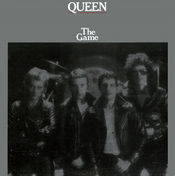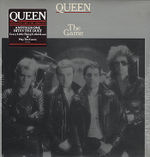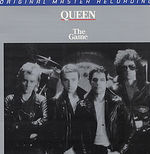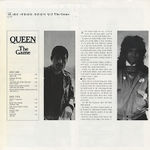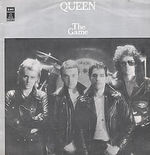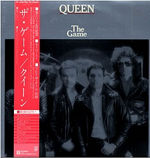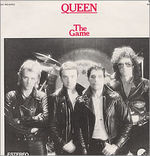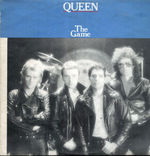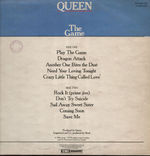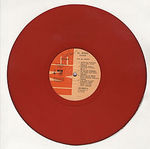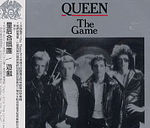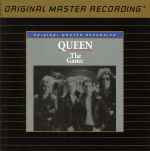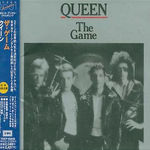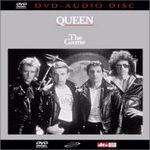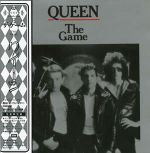From Queenpedia.com
(→Tracklists) |
(→Tracklists) |
||
| Line 17: | Line 17: | ||
|valign="top" style="width:350px;"| | |valign="top" style="width:350px;"| | ||
'''Vinyl version'''<br> | '''Vinyl version'''<br> | ||
| - | '''Side 1:'''<br> | + | * '''Side 1:'''<br> |
# [[Play The Game]]<br> | # [[Play The Game]]<br> | ||
# [[Dragon Attack]]<br> | # [[Dragon Attack]]<br> | ||
| Line 23: | Line 23: | ||
# [[Need Your Loving Tonight]]<br> | # [[Need Your Loving Tonight]]<br> | ||
# [[Crazy Little Thing Called Love]]<br> | # [[Crazy Little Thing Called Love]]<br> | ||
| - | '''Side 2:'''<br> | + | * '''Side 2:'''<br> |
# [[Rock It (Prime Jive)]]<br> | # [[Rock It (Prime Jive)]]<br> | ||
# [[Don't Try Suicide]]<br> | # [[Don't Try Suicide]]<br> | ||
Revision as of 01:28, 14 June 2007
After the relatively cool reception to the Jazz album, the band again parted ways with Roy Thomas Baker, this time for good, and set their visions on a new method of recording. Unsatisfied with how their previous album had turned out, the band teamed up with Mack, who had previously worked with ELO, at Musicland Studios in Munich, Germany. The decision to record abroad had not been made lightly: because of their massive earnings from worldwide record sales and tours, the band had been advised to set up a temporary base outside the United Kingdom. Though they purchased Mountain Studios in Montreux, they wouldn't make it their main studio until later in the 1980s; for the time, the peace and tranquility that Switzerland afforded them was not conducive to their work environment, which made the far more exciting Munich more desirous to the band.
Despite their new surroundings, the band weren't in any rush to begin recording again, and used the initial sessions as a means of testing out the working methods between band and producer. In June 1979, the band started work on their new album, and so laid-back were the sessions that only four usable tracks were created: Coming Soon (which had been started during the Jazz sessions), Sail Away Sweet Sister, Save Me, and Crazy Little Thing Called Love. An instant click was felt, and Mack was willing to explore more experimental methods of recording as opposed to Roy Thomas Baker's more tried-and-trusted approach. At the end of the month-long sessions, the band called a halt to the proceedings in order to take some time off and prepare for an upcoming tour of the United Kingdom.
During rehearsals, two of the new songs - Crazy Little Thing Called Love and Save Me - were integrated into the repertoire, and instantly became crowd favorites. It comes as no surprise that these two songs were issued as the next two Queen singles, in October 1979 and January 1980, respectively. With rockabilly now back in style (due in no small part to the passing of Elvis Presley in 1977), Crazy Little Thing Called Love was the perfect opportunity to introduce Queen's new image and sound to their adoring fans, who ate it up and sent the single to #2 in their home country, while becoming the band's first Stateside #1 single in December. Save Me followed suit as a UK-only release, reaching a respectable #11.
Sessions recommenced in February after a considerable holiday break. The band had more ideas this time, with Roger once reporting that forty songs had been submitted for the album - certainly enough for a double album, once all the decent material had been separated from the sub-par. Yet, surprisingly, only ten songs appeared on the album - the least amount on any new release since A Day At The Races - with the running time clocking in at just over 35 minutes. The presence of Crazy Little Thing Called Love and Save Me, by the time of the album's release (June 1980) nine and six months old, respectively, were seen to be cop-outs; thus, only eight "new" songs were presented. One known outtake from the sessions, Roger's A Human Body, was rejected from the final running order because it was deemed "too melodic"; instead, it appeared on the B-side of Play The Game in May 1980. Another song, Soul Brother, has been thought to have originated from these sessions; though it appeared as the B-side of Under Pressure in October 1981, it's likely that the rhythm track was recorded during sessions for The Game, while the vocal track was recorded (or re-recorded) to tie in with Under Pressure.
One aspect that critics were quick to point out (and, occasionally, praise) was the obvious desire to focus more on rhythmically-charged songs instead of lengthy epics. There weren't any Bohemian Rhapsodys or The Prophets Songs; the drums and bass were brought up further in the mix, while guitars were reduced to providing rhythm and an occasional solo, thus eliminating the famed orchestrations that made Queen's music in the 1970s so appealing. Another new factor was the introduction of the synthesizer, which would upset a small percentage of the fans. The band themselves were unsure of the shift, but the music world was evolving, and it would have been career suicide to have not evolved as well. Synthesizers were used liberally on several songs throughout the album: Play The Game, Rock It (Prime Jive), Sail Away Sweet Sister, Coming Soon, and Save Me all featured the offending instrument, and most have debated its success, with varying results. Also, more mundanely, fans were introduced to the startling image of Freddie with a bushy mustache, which he had grown to self-consciously hide his protruding teeth (according to legend, during the North American tour in 1980, Freddie was bombarded with disposable razors and pleas from the audience to shave the offending facial hair).
Despite the drawbacks of the album, it went on to achieve great success, reaching #1 on both sides of the pond, becoming Queen's first (and only) #1 album in the United States. The singles drawn from the album, too, were big hits: all were Top Twenty in the United Kingdom, while the album scored two #1 hits in the United States - the aforementioned Crazy Little Thing Called Love, and Another One Bites The Dust in August 1980. Play The Game reached #14 in the UK, but only managed a disappointing #42 in the US, while Need Your Loving Tonight, issued only in the US in lieu of Flash in November 1980, peaked two places lower at #44. The Game was remastered and released on CD in 1991, with a dance-rap remix of Dragon Attack though, surprisingly, studio outtakes or even the non-album B-side A Human Body weren't featured.
Tracklists
|
Vinyl version
|
1991 Hollywood Records CD |
Credits
- Musicians:
- John Deacon - bass guitar, rhythm guitar on Dragon Attack and Another One Bites The Dust, acoustic rhythm guitar on Need Your Loving Tonight, piano on Another One Bites The Dust
- Brian May - guitars, vocals, synthesizer, piano on Save Me, lead vocals on Sail Away Sweet Sister
- Freddie Mercury - vocals, piano, synthesizer, acoustic rhythm guitar on Crazy Little Thing Called Love, intro vocals on Rock It (Prime Jive), bridge vocals on Sail Away Sweet Sister
- Roger Taylor - drums, percussion, vocals, synthesizer, rhythm guitar and co-lead vocals on Coming Soon, lead vocals on Rock It (Prime Jive)
- Mack - synthesizer
- Recorded: June - July 1979 (Crazy Little Thing Called Love, Sail Away Sweet Sister, Coming Soon, and Save Me) and February - May 1980 (all other tracks) at Musicland Studios, Munich.
Charts
- #1 (UK), #1 (US).
Queen talks
- Notes
Additional info
- Info
Reviews
Rolling Stone, 1980
With the usual fanfare–in this case, a "breakthrough" single released several months prior to the LP – Queen have shifted their sights from heavy-metal flash to stripped-down rock & roll. Maybe they realized that they'd come to a dead end, that it was time to ditch the cold, bombastic eclecticism and overweening arrogance that made News of the World and Jazz so offensive. Or maybe they just figured it'd be good to try fresh terrain. Whatever the reasons, it's nice to hear a Queen album with songs, not "anthems."
Yet this doesn't mean they can actually play the new stuff. Stiffness was the most distinctive characteristic of "Crazy Little Thing Called Love," once you got past the obligatory "Gee whiz, is this Queen?" feeling. And the incessant airplay got a lot of us past that feeling pretty quickly. It's the same with the rest of The Game. Freddie Mercury sings, "It swings (Woo Woo)/It jives (Woo Woo)/It shakes all over like a jelly fish," but the band can merely plod through material that demands some suppleness. Even "Need Your Loving Tonight," the finest of the rock & roll numbers here, keeps tripping over its sluggish power chords.
Sad to say, Queen seemed more comfortable with the brazen hodgepodge of "Bohemian Rhapsody," the martial madness of "We Will Rock You" and the pointless frenzy of "Bicycle Race." Black leather jackets, echo chambers, funky handclaps, prominent bass lines and sparse instrumentation – these guys know how this music should sound and feel, but they can't bend enough to get with it. Which is probably why some of the current record consists of the same inflated ballads and metallic shuffles that have padded every previous Queen disc.
Certainly, The Game is less obnoxious than Queen's last few outings, simply because it's harder to get annoyed with a group that's plugging away at bad rockabilly than with one blasting out crypto-Nazi marching tunes. The future doesn't look bright, however. No matter how much Queen may try to hide it, they're still egomaniacs. Take "Don't Try Suicide," for example. It's a basic rocker in which the singer has to sound worried and concerned. Mercury brandishes a full array of mid-Fifties vocal hiccups, but the best he can do is seem a bit pissed off–as if the biggest crime of the impending suicide is that it's going to bug Freddie. Moments like this make you wonder if the old Queen are really dead after all.
Additional Reviews
Sleeves
|
| |||
|
| |||
|
| |||
